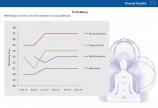Coming of Age: a balancing act between work, school and life
- Anne MacLaurin

When you hear the word ‘teenager’ do you imagine someone closed up in their room obsessed with their phone, text messages and social media? Or is it someone trying to balance work, school, health/stress, volunteering and family relationships? Recent research has proven the latter: the vast majority of teens care deeply about others and are involved in their communities. At the same time, many are facing very adult issues such as debt, finding affordable housing, stress and hypertension.
These results are part of a first-of-its-kind study, “Changes and Challenges: A Decade of Observations of the Health and Well-Being of Young Adults in British Columbia,” which was released today by Island Health and UVic. It spans a decade (2003-2013) of repeat interviews with 662 young people from Greater Victoria as a random-sample cohort of youth from ages 12 to 18.
“This snapshot in time of people now 25 to 31 years old is applicable to any youth right now,” says UVic psychologist and lead author Bonnie Leadbeater. “Being 12 to 18 years old is the time in life where young people are establishing a foundation for lifelong well-being. This study carries important national messages about the need for better policies and changes in attitudes and actions to improve youth self-care, promote health and reduce stress in this age group.
Public depictions often focus on millennials’ socially active lifestyles, lack of sleep, alcohol use and time spent on electronic devices. The new study calls for a whole-person approach that views young adults as connected to parents and romantic partners rather than as independent and isolated.
“Far from the carefree, party-oriented youth culture of the advertisements that target them, many youth in this study were found to be juggling education, work, lack of sleep, mental health and relationship problems,” says Richard Stanwick, co-author and chief medical officer of Island Health. “Hypertension and obesity are also threatening the long-term health of more than a third of these young people.”
The study outlines the health, social and financial factors and also notes the need for improved self-care through adequate sleep, physical activity, healthy eating and stress regulation. It found that many of the youth pursued higher education—with 45 per cent completing a university degree, 23 per cent obtaining a college diploma and 19 per cent becoming certified in a trade.
Murray Fyfe, second co-author and a medical health officer with Island Health, adds, “A public health approach with an emphasis on healthy public policies can have wide-reaching effects. This includes policies related to income, post-secondary education, affordable housing, transportation and access to healthy food. While the health and well-being of young adults may not often be at the forefront of our minds, support for this age group does deserve more attention.”
The next time you imagine the life of a teenager, consider taking an extra moment to appreciate the delicate balancing act they are performing between work, school and life. Coming of age in the 21st century is a struggle for many young people, but most are staying connected to their families and communities, and most are healthy. The study argues for a shift in public policy to focus support for youth to help manage stress, debt, work, school as they transition to adulthood.



